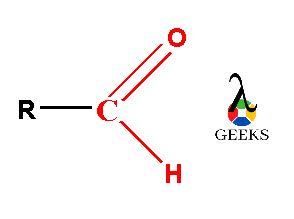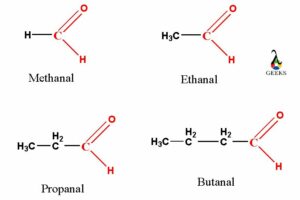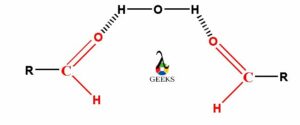Aldehydes are the organic compounds containing –CHO group, which are formed by the oxidation of organic compounds containing –OH group i.e. alcohols (ethanol, methanol, etc.)
In aldehydes, the central carbon atom is linked with oxygen atom forming double bond known as carbonyl group and with hydrogen atom forming single covalent bond. Also the carbon atom attached with the alkyl group denoted by ‘R’. The basic chemical formula for aldehyde is R-CHO. Here in this editorial, we are learning about the topic ‘Are aldehydes soluble in water’ and its some various facts.

Why are aldehydes soluble in water?
Aldehydes are soluble in water due to the polar nature of carbonyl group (C=O) present in it. In carbonyl group, the electrons form density towards oxygen as compare to carbon atom because oxygen atom is more electronegative than carbon atom.
So, there is a partial positive charge creates on carbon atom and partial negative charge creates on oxygen atom. Therefore, positive side of one polar compound gets attracted with negative side of other polar compound.
The physical properties of aldehydes like dipole moment, boiling point, melting point, etc. get affected due to the polar nature of carbonyl group present on it. Also the carbonyl group containing molecules like aldehydes have higher boiling and melting points. For Ex. Propanal has 56 degree boiling point as compare to acetone which has 49 degree boiling point similarly butane has 32 degree boiling point.
As the butane is non-polar in nature it has lowest boiling point rather than the propanal and acetone which has carbonyl group has polar nature and they have a tendency to attract other polar molecules. The polar compounds attract each other they need more energy to detach from each other. Therefore have high temperature.
At normal conditions formaldehyde is a gas and at room temperature acetaldehyde boils. Other aldehydes with lower molecular weight are liquids at room temperature. Non-polar molecules are not mix with polar molecules as polar-polar molecules attracts each other and non-polar molecules are unable to interfere between them.
Thus, water comes under polar molecules and aldehydes too polar molecules they attracts each other and becomes soluble with each other.
Which aldehyde is soluble in water?
As we seen above the aldehydes and water both are polar in nature so they do soluble with each other. But not all aldehydes get easily soluble in water. The lowest aldehyde i.e. formaldehyde (HCHO) is gas at normal conditions so it does not soluble in water.
Only the aldehydes which contain less than five carbon atoms in it are soluble in water. Aldehydes more than five carbon atom are not soluble. The higher aldehydes are not soluble in water because the increasing hydrocarbon chain of aldehydes makes it insoluble in water.
The lower aldehydes are easily soluble in water because the carbonyl group present in it when mixed with water creates a hydrogen bonding within oxygen atom of carbonyl (C=O) group and hydrogen atoms of water (H2O) molecules.
Which aldehyde is most soluble in water?
The aldehydes containing less than five carbon atoms in its structure i.e. lower aldehydes are aldehydes soluble in water. The aldehydes like formaldehyde, acetaldehyde, n-propionaldehyde and butyraldehyde. The IUPAC name of formaldehyde is methanol, acetaldehyde is ethanol, n-propionaldehyde is propanal and butyraldehyde is butanal.

As the aldehyde does not form hydrogen bonds with other aldehydes, they form hydrogen bond with water molecules. So they dissolve in water.
Why are lower aldehydes soluble in water?
As we see above in part of the editorial which aldehydes are soluble in water? Those all above examples of aldehydes are the lower aldehydes which get easily soluble in water.
Lower aldehydes are soluble in water because they have lower chain of carbon atoms. Aldehydes containing more than five carbon atoms are not soluble or sparingly soluble in water.
As the carbon chain increases in aldehydes the properties of aldehydes get change like there is decrease in solubility of aldehydes in water. The decrease in solubility is due to the non-polar nature of longer hydrocarbon chain. Similarly other properties like melting point, boiling point and dipole moment also decreases.
Are lower aldehydes soluble in water?
Yes, lower aldehydes are easily soluble in water due to the formation of hydrogen bond between aldehyde and water molecules. As both molecules are polar in nature they get attracts each other.
The more electronegative oxygen atom of carboxylic group of aldehyde attracts hydrogen atom of water molecule towards itself and form hydrogen bond (which is a weak bond) between them.

Are higher aldehydes insoluble in water?
Yes, higher aldehydes are insoluble in water. Specially, the aldehydes containing five or more than five carbon atoms in its structure are insoluble or sparingly soluble in water molecules.
Even the aldehydes are polar in nature and water also polar in nature, still only lower aldehydes get soluble and higher aldehydes are insoluble. Because the long chain of carbon atoms in aldehydes make them non-polar molecule.
Why are higher aldehydes insoluble in water?
All aldehydes contain carbonyl group in it, due to which the polarity creates in aldehydes. The polarity creates due to the dipole moment on carbonyl group of aldehydes. As the carbon atom of carbonyl group is more electronegative than oxygen atom. Due to less electronegativity of oxygen atom it attracts electron density towards itself and creates partial positive charge on carbon atom and partial negative charge on oxygen atom.
But still after the presence of carbonyl group which creates dipole in aldehydes, higher aldehydes are insoluble or sparingly in water. Because the presence of long carbon chain or hydrocarbon molecules in aldehydes. The higher aldehydes show non-polarity and it is hard for them to create bond with water molecule. Higher aldehydes get dissolved in organic solvents like ether, carbon tetrachloride (CCl4), benzene, etc.
As the long carbon chain increases in aldehydes, the hydrophobic side of hydrocarbon chain dominated over the hydrophilic side of polar –CHO group of aldehyde. Thus higher aldehydes are insoluble in water molecules.
Is aldehyde more soluble than ketone?
No, aldehydes are not more soluble than ketones in water. The ketones are more soluble in water than aldehydes. As the solubility of both ketone and aldehyde molecules get decreases as the hydrocarbon chain increases in molecule.
Ketone molecule consists of two alkyl group in its structure and aldehyde molecule consists of one hydrogen atom and one alkyl group in its structure. As the alkyl group is more electron donating in nature. So we can say ketones get more polar in nature than aldehydes due to the presence of two alkyl group in it.
Even as the alkyl group or carbon chain of both aldehydes and ketones get increases, both the molecules become more non-polar in nature, due to which its solubility becomes more.
But lower ketones seems to be more soluble than lower aldehydes, as the two alkyl groups get distributed around carbonyl (C=O) group of ketone molecule. As the ketone molecule contains more alkyl groups, so they have the capacity to release more electrons which cause an inductive effect and making the carbonyl group of ketone molecule more polar in nature.
Thus the lower ketones containing same carbon atom numbers are slightly more soluble than aldehydes in water. So acetone is more soluble in water than acetaldehyde.
Are aldehydes liquid?
Yes, some aldehydes are in liquid form. But not all aldehydes are liquid in nature.
Formaldehyde or methanol is in gaseous state at normal condition and having pungent smell. Ethanal or acetaldehyde is a liquid but volatile in nature.
Other aldehydes which have up to eleven number of carbon atoms in its structure are in liquid form and look colourless.
But the aldehydes having more than eleven carbon atoms i.e. higher aldehyde members are present in solid forms.
Thus, the aldehydes containing eleven carbons atom chain in its molecule is present in liquid forms.

Hello everyone, I am Dr. Shruti M Ramteke, I did my Ph.D. in chemistry. I am passionate about writing and like to share my knowledge with others . Feel free to contact me on linkedin